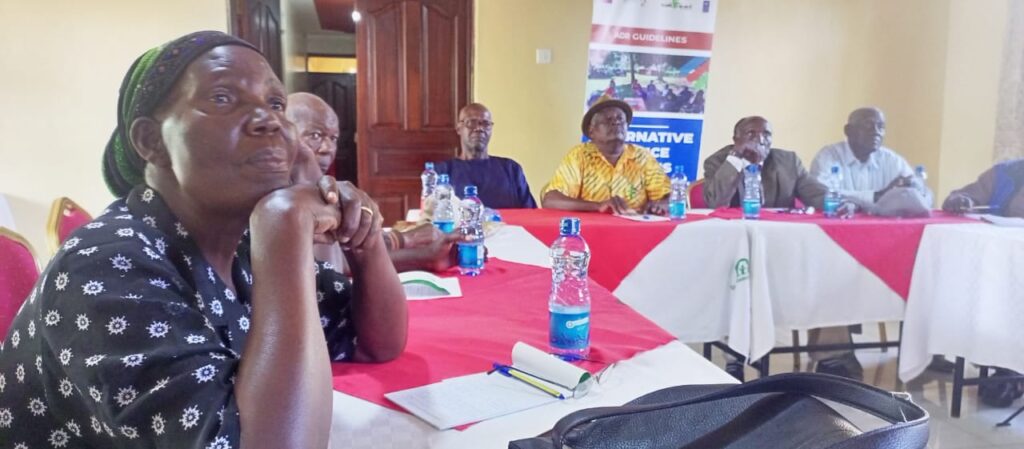Land disputes in Kisumu continue to soar, with women being the biggest victims.
However, elders who should be at the centre of land ownership, succession and inheritance are nowhere to be seen.
A legal aid exercise by Civil Society Organization (CSO) Network in December 2022 revealed that families are entangled in disputes, some of which causing death, hatred and bungled families.
During the exercise conducted in all the seven sub counties of Kisumu County, chiefs stood out as key players in land disputes.
the project is supported by the EU through UNDP Amkeni Wa Kenya Project. Also the volunteers are staff from the different state and state organs. The collaboration is important. National Land Commission, Ministry of Lands, National legal Aid Service, Kisumu Legal Aid Centre, Council of Elders, Social Justice Centres, CSO Network.
Out of all our meetings, no one mentioned elders as having played part, nor being proactive to help solve the disputes
Betty Okero
According to CSO Network team leader Betty Okero, the exercise revealed that elders have taken a back seat in helping solve land disputes.
“Out of all our meetings, no one mentioned elders as having played part, nor being proactive to help solve the disputes,” she said.
“Elders are foreign in their communities,” she added.
The exercise exposed systemic injustice meted upon the vulnerable in the society, such as widowed women, orphans, female siblings and Persons With Disabilities (PDWs).
Many land injustice victims blamed chiefs for leading in the injustices, by seeking bribes to make unjust rulings on land ownership.
And in a session which brought together elders from Kisumu, it was evident that they have abdicated their roles in the communities they come from.

Elders admit laxity
Led by Luo Council of Elders Secretary Mzee Silas Olala, the elders admitted to having lost touch with their communities, a situation which has kept them out of the land processes.
“In ideal situation, we are supposed to have chairmen at all the administrative levels, starting from the village, sub-location, location, all the way to the national level,” said Olala.
He however noted that only the national office of the Council of Elders was active, with the lower levels missing.
“What kind of elders are we? We have lost direction,” said Olala.
According to Mzee Olala, the land disputes can only be solved if elders take a lead role, as they understand the history of the land.
“Let us get out and help our people. We have been quiet, giving way for kangaroo elders who are misleading our people.” He added.
Some of the leaders claim that political interference has weakened the council, making it difficult to stamp its authority in the community.
These land disputes are sources of income for some chiefs, and that is why they keep us elders from initiatives aimed at solving these disputes
Mzee Lawy Raburu
Some also claim that due to poverty, the elders cannot wield power and authority which would give them the strength to intervene on land disputes facing the community.
“The elders who are poor are not listened to,” said Narman Ayuka, an elder from Muhoroni.
“These land disputes are sources of income for some chiefs, and that is why they keep us elders from initiatives aimed at solving these disputes,” said Lawy Raburu, and elder from Seme.
The elders said they need both financial and moral support to help them deliver the desired services to the communities.
But Ms Okero urged the elders to come out and claim their space so as to save the community from the escalating disputes.
“The constitution gives elders the power by recognizing our culture, and Council of Elders is part of our culture. You do not need any permission from anybody to render services to our communities,” she said.
